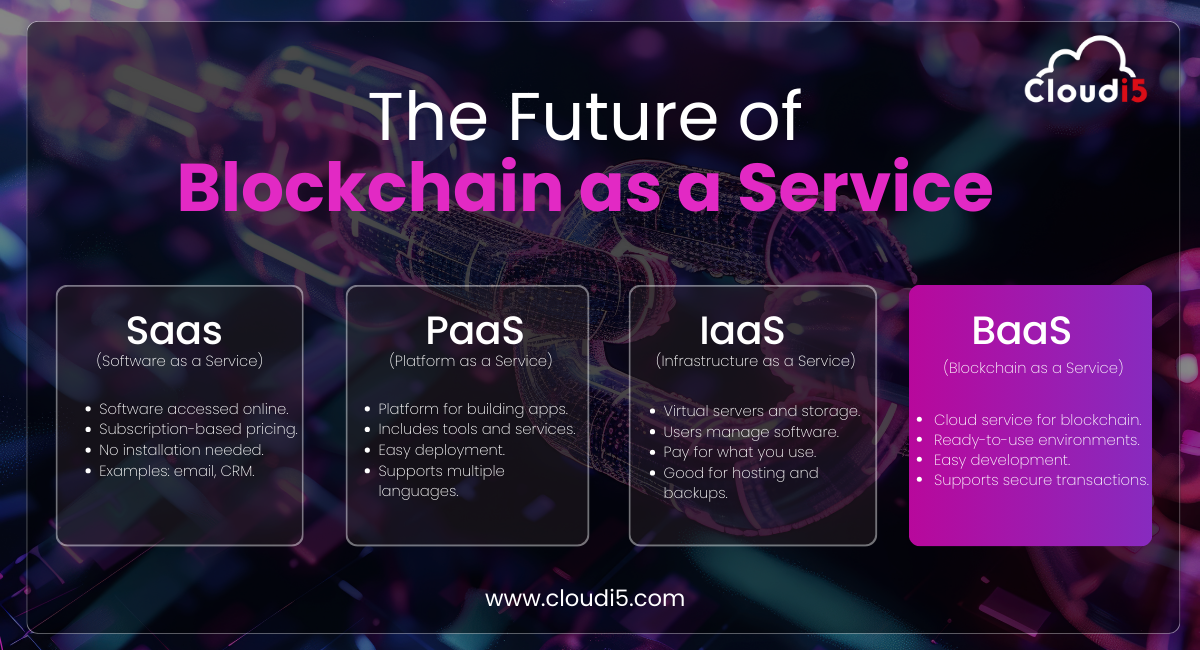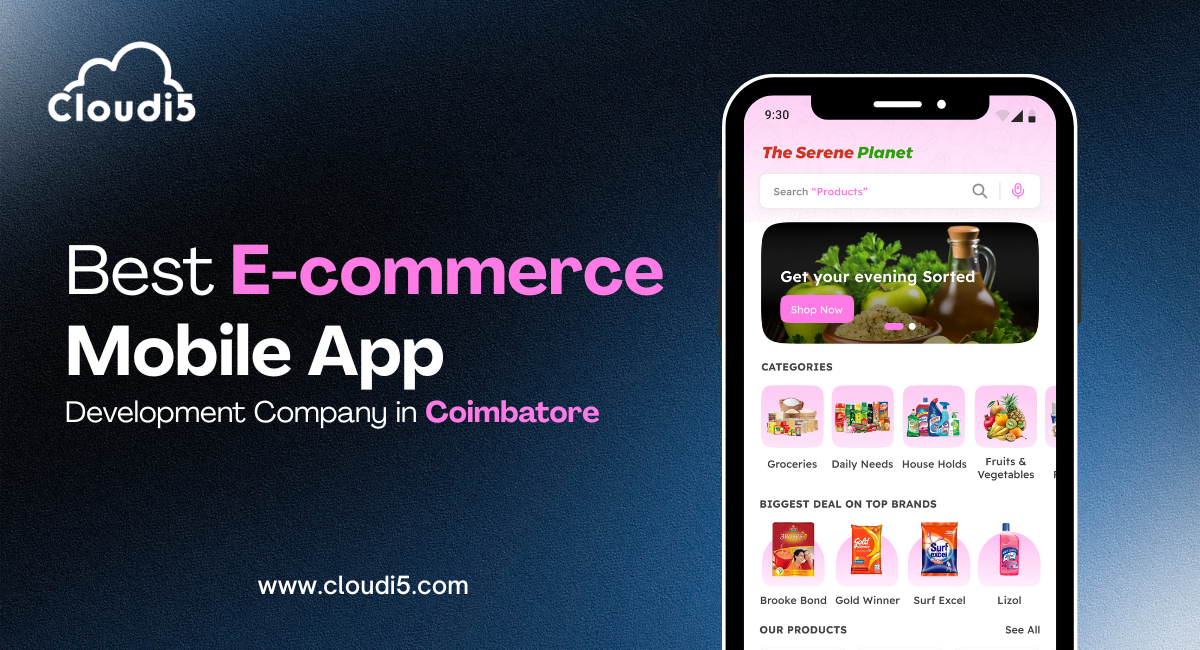
The Future Of Blockchain As A Service
Blockchain as a Service (BaaS) is changing the business game! This technology makes it super easy for companies to use blockchain—no tech skills needed. With BaaS, businesses can boost security, improve transparency, and simplify their processes without the usual hassles of setting everything up. It’s all about making things better while keeping it simple.
As the digital world moves faster than ever, BaaS is becoming an essential tool for companies that want to stay ahead. But what’s next for this exciting service? Will BaaS become a big part of the tech future, or will it run into some challenges? Let’s explore the future of Blockchain as a Service and see how it could change industries in ways we’re just starting to see.
What is BaaS? A Brief Explanation
Blockchain as a Service (BaaS) is a cloud-based platform that helps businesses use blockchain technology without needing a lot of technical know-how. BaaS providers handle the complicated tech stuff, allowing companies to focus on creating apps and solutions that take advantage of blockchain’s benefits.
Comparing BaaS with Other Cloud Services
- Software as a Service (SaaS): SaaS gives users ready-made software applications that they can use right away. In contrast, BaaS provides the core blockchain technology that businesses need to create their own applications.
- Platform as a Service (PaaS): PaaS offers a platform where developers can build, run, and manage applications. BaaS, however, focuses specifically on creating a platform for blockchain applications.
- Infrastructure as a Service (IaaS): IaaS provides the basic building blocks for cloud computing, like servers, storage, and networking. BaaS is a special type of IaaS that is designed specifically for blockchain technology.
How BaaS Differs from Traditional Blockchain Solutions?
- Accessibility: Unlike traditional blockchain systems that require a lot of tech skills and resources, BaaS makes blockchain easier for more businesses to use.
- Scalability: BaaS providers have the resources to handle the growth challenges that come with blockchain networks.
- Cost-Effectiveness: By sharing the costs of running and maintaining blockchain systems, BaaS can save businesses money compared to building their own solutions.
Key Features of BaaS Platforms
- Scalability: BaaS platforms can grow to handle more transactions and data as needed.
- Security: BaaS providers use strong security measures to protect user data and keep it safe from unauthorized access.
- Cost-Effectiveness: BaaS is often cheaper for businesses since it removes the need for large upfront costs for hardware and software.
- User-Friendliness: BaaS platforms usually have easy-to-use interfaces and tools, making it simple for developers and non-technical users to build and launch blockchain apps.
- Integration: BaaS platforms can connect with other systems and apps, making it easier to add blockchain to current business processes.
The Growing Demand for BaaS
More industries are starting to adopt blockchain technology, leading to increased demand for BaaS solutions. Businesses see the potential benefits of blockchain, such as better security, transparency, and efficiency, but many don’t have the resources or expertise to create their own blockchain networks. BaaS provides a simple and cost-effective way to access these benefits.
Examples of Industries Where BaaS is Gaining Traction
- Financial Services: Banks and financial institutions use BaaS to create new products like digital currencies, smart contracts, and supply chain financing.
- Healthcare: Healthcare providers are looking at BaaS for safe data sharing, electronic health records, and managing clinical trials.
- Supply Chain Management: BaaS helps improve transparency and efficiency in supply chains, reducing the chance of fake products and fraud.
- Gaming: BaaS is used to build decentralized gaming platforms that give players more control over their assets and rewards.
- IoT: BaaS can create secure and decentralized Internet of Things (IoT) networks, enabling devices to share data and work together.
Use Cases and Applications of BaaS
Supply Chain Management
- Clear Records: BaaS helps keep a clear and permanent record of how products move from raw materials to finished goods.
- Tracking Products: You can track each product through the supply chain to make sure it meets quality standards and follows the rules.
- Stopping Fakes: BaaS helps stop fake products by showing where a product comes from and how it was made.
- Better Inventory: BaaS allows real-time tracking of inventory, which helps prevent running out of stock or having too much.
Financial Services
- Easy Payments: BaaS makes it simple and safe to send money across borders, lowering costs and speeding up transactions.
- Lending Options: BaaS supports platforms that allow people to lend and borrow money directly, giving borrowers more choices and lenders better returns.
- Faster Trading: BaaS speeds up the trading of stocks and other securities, making the market work better.
- Digital Assets: BaaS helps create and manage digital assets like cryptocurrencies and tokens.
Healthcare
- Safe Data Sharing: BaaS allows healthcare providers to share patient data securely, improving care and research.
- Electronic Health Records: BaaS provides a safe place to store and manage electronic health records.
- Managing Trials: BaaS helps manage clinical trials efficiently, ensuring accurate data and speeding up new treatment development.
IoT (Internet of Things)
- Secure Communication: BaaS offers a safe network for IoT devices to share data with each other.
- Working Together: BaaS allows different IoT devices to work together, helping create new applications.
- Protecting Privacy: BaaS helps keep IoT data private by storing and sharing it securely.
Other Uses
- Gaming: BaaS can create gaming platforms that give players more control over their assets and rewards.
- Real Estate: BaaS can manage property ownership records and smart contracts for shared ownership.
- Identity Management: BaaS can securely manage digital identities to help prevent identity theft.
Current Market Landscape
The BaaS market is growing quickly as more businesses start using blockchain technology. Big cloud providers like Microsoft Azure, IBM Blockchain, and Amazon Managed Blockchain offer BaaS solutions. Other important names include Oracle Blockchain Platform, Hyperledger Fabric, and Corda.
Different industries show different trends in using BaaS. Financial services and supply chain management are early users, while healthcare and IoT are catching up fast.
Overall, the BaaS market is expanding with more investments and businesses using blockchain technology through BaaS. While numbers may change, it’s clear that BaaS is a growing field with a lot of potential.
Challenges and Opportunities in the BaaS Landscape
Technical Challenges
- Scalability: As more businesses use blockchain, BaaS providers need to make sure their platforms can handle more transactions and larger amounts of data.
- Interoperability: Different blockchain networks and applications need to work well together for BaaS to be widely adopted.
- Security: Keeping user data safe and preventing hacks is very important for BaaS providers, especially as the value of blockchain assets increases.
Regulatory Challenges
- Changing Rules: Laws about blockchain are always changing, and different places have different rules. This can make it hard for BaaS providers to keep up and follow the laws.
- Impact on Adoption: Clear and consistent rules are needed to build trust in blockchain technology and encourage more businesses to use BaaS.
Competition
- High Competition: The BaaS market is busy, with large cloud companies and smaller blockchain startups all trying to get a piece of the market.
- Standing Out: To succeed, BaaS providers need to show how they are different by focusing on things like scalability, security, ease of use, and extra services.
Opportunities for Innovation
- New Business Models: BaaS providers can explore new ways to do business, like offering subscription plans or sharing money with app developers.
- Flexible Pricing: Different pricing options, such as pay-as-you-go or tiered plans, can help BaaS providers attract more customers.
- Extra Services: Offering additional help, like consulting, integration support, and compliance guidance, can make BaaS platforms more attractive.
The Future of BaaS
- Tech Advancements: Combining blockchain with technologies like artificial intelligence (AI) and the Internet of Things (IoT) can create new chances for BaaS, including smart contracts and better supply chain management.
- Decentralized Finance (DeFi): BaaS can support DeFi applications, which can change how financial services work by providing more transparency and access.
- Future Regulations: The growth of BaaS will depend on how future rules are made. Clear rules can help build trust in the technology.
Conclusion
BaaS has the power to change industries by making blockchain technology easier to use. While there are challenges to face, the chances for new ideas and growth are strong. As the technology keeps improving, BaaS is set to play an important role in shaping the future of businesses and society.
Trusted By












Leave Comments